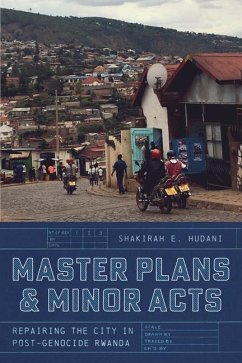"How might a devastated and divided country, undergoing accelerated urbanization and growth, find its way to an equitable future? What is the role of the city as a terrain for reconciliation and redistribution, and who determines the contours of such processes? These questions are at the heart of Shakirah Hudani's Master Plans and Minor Acts, a detailed examination of the regeneration of post-genocide Rwanda and its capital city of Kigali. While studies of reconciliation in Rwanda have for the most part focused on the national level, Hudani argues that much of the actual work of repair has been in rebuilding Kigali and urban centers around the country. Hudani therefore shifts our perspective to the level of the city: where, through years of fieldwork, she has observed on-the-ground negotiations over material redistribution, dispossession, and rebuilding in the wake of the country's civil war and 1994 genocide. This work of reconciliation at the city and neighborhood level, she shows, has been significantly impacted by efforts to reconstruct the city through largescale master planning, often involving international finance and expertise. Through an examination of this national-urban dynamic, Hudani shows that reconciliation in Rwanda has been, and continues to be, primarily a socio-material and spatial process, consisting of negotiation over property, homes, and the right to urban space"--
Hinweis: Dieser Artikel kann nur an eine deutsche Lieferadresse ausgeliefert werden.
Hinweis: Dieser Artikel kann nur an eine deutsche Lieferadresse ausgeliefert werden.








